Nairobi Climate Talks
Air Date: Week of November 17, 2006
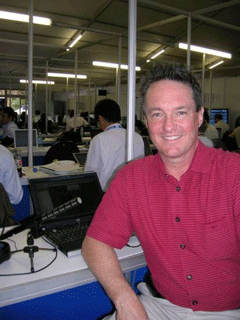
Reporter Terry FitzPatrick on site at the Nairobi conference.
At the latest world meeting on confronting climate change, environment ministers prioritized helping poor countries who are on the frontlines of global warming. But producer Terry FitzPatrick reports there was not much progress on the key issue of limiting emissions from the powerhouse countries of China, India and Brazil.
Transcript
BRUCE: It's Living On Earth, I'm Bruce Gellerman
[SWAHILI SINGING]
BRUCE: More than two thousand delegates from 189 countries have just wrapped up this year’s climate change conference in Nairobi, Kenya. U- N secretary general Kofi Annan told the delegates their job wasn’t just about protecting the environment. It was about fairness.
ANNAN: All of us want to see a day when everyone, not just a fortunate few, can live in dignity and look to the future with hope. That vision, which has always faced long odds, is being placed in deeper jeopardy by climate change.
BRUCE: There was a lot of talking, some progress, but little action coming out of the Nairobi conference -- at least on the key issue of limiting emissions of greenhouse gases.
Living on Earth’s Terry FitzPatrick joins us from Nairobi. Hi Terry.
TERRY: Jambo, Bruce.
BRUCE: Jambo, Terry. I understand the Kenyans took this gathering very seriously because for them the changing climate is not a distant concept.

Reporter Terry FitzPatrick on site at the Nairobi conference.
[SOUND OF MASAI VILLAGE]
TERRY: I went out one morning, Bruce, to the edge of Nairobi, to an area that’s called Kasarani. And there you can see collections of Masai herders squatting on vacant fields.
[COW SOUNDS FROM MASAI VILLAGE]
TERRY: The Masai, they’ve have always been nomadic, but the elder here, Ole Kisompol, says these families had to abandon their traditional lands because of relentless droughts.
KISOMPOL: (translated) He is saying the temperatures of here are getting more
hotter. When you look after cows or sheep, you feel like you want to melt because there is too much hot and the livestock are very much suffering because of that condition. Because when it rains, the grass just come--to be dry very, very soon. And then another drought come, another drought come, so that is how it affects them.
[MASAI PRAYER SINGING]
TERRY: Some of the displaced Masai herders actually came to downtown Nairobi to join a protest march for action on climate change. A couple thousand people sang these traditional songs as they held signs that said “stop climate chaos.”
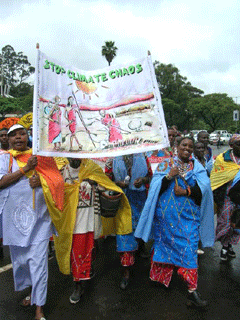
Protests abounded in downtown Nairobi. (Photo: Terry FitzPatrick)
BRUCE: Well Terry, is the Kyoto process prepared in any way to address their concerns and concerns like this?
TERRY: It is now. The Nairobi conference put in motion a fund to help poor countries adapt to climate change. In fact there’s a new buzzword and concept popping up now: making international aid “climate proof.” That’s the new word: climate proof. The fear is that development assistance to places like Kenya will be undermined by climate shifts and shocks.
BRUCE: Climate proof. How do you “climate proof” a country?
TERRY: Well, in some places you probably can't like parts of Bangladesh. But in some places, tidal barriers may lessen storm surges. Drought-resistant crops and livestock may help in other places. The Kyoto system creates a tax on some of the trading in pollution credits, which generates money that’s intended to help the poor countries. There’s only about 3 million in this fund right now – it’s just gotten started – but it is expected to grow rapidly.
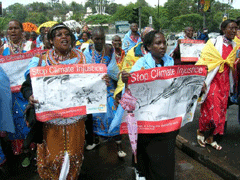
African farmers protest in downtown Nairobi.(Photo: Terry FitzPatrick)
TERRY: Well, no clear signs right now. These countries have been classified as "developing" in the Kyoto system, but they are of course developing rapidly. Many people feel they belong with the top tier of 35 nations that have signed formal commitments under Kyoto to reduce their emissions.
BRUCE: Are any of these developing-nation leaders talking about having a moral responsibility to address climate change by limiting their emissions?
TERRY: The Chinese and others are still saying that the top tier of nations should make the first move for what comes next after 2012 when the current Kyoto commitments come to an end. Even though China is on track to become the world’s largest emitter of carbon dioxide…and even though scientists are warning we’re near a tipping point now, possibly, where human action won't be able to head off severe climate disruption. The dynamic at these conferences is still something of a standoff. There is still a lot of "you first" "no, you first." That’s the attitude.
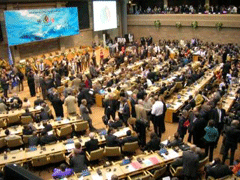
Thousands of delegates converge on Nairobi to chart a path forward on climate change. (Photo: Terry FitzPatrick)
TERRY: No, and the US continues to send lower level delegates to these conferences. Other countries send ministers. At this conference people were really saying that individual states may be where things move forward for now in the U.S., like the new program in California. In fact, some people were wearing buttons here; one has a picture of Governor Schwarzeneger saying “action hero,” and the other has an image of President Bush saying “action zero.”
BRUCE: Get me a couple of those buttons, Terry?
TERRY: You got it.
BRUCE: So, no comprehensive package for global emissions reductions in the post-2012 period coming out of this Nairobi conference then?
TERRY: No. More talking, but no commitments. And the fear is that there will be some kind of commitment gap coming after 2012 if no deal is done in time. What people worry about there is that a gap could undercut the growth in emissions trading system that is supposed to get the marketplace to solve the greenhouse gas problem.
BRUCE: So bottom line Terry, did anything come out of Nairobi?
TERRY: Well, trees.
MAATHAI: Now you will go down with it. Where is the shovel? Mr. president, now you shovel the soil.
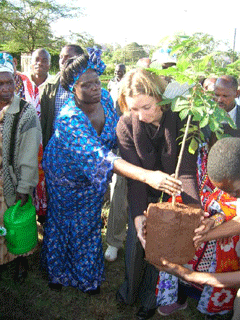
The U.N. launched the “Plant for the Planet: Billion Tree Campaign” at the conference in Nairobi. (Photo: Terry FitzPatrick)
MAATHAI: Okay, very well, now we’ll plant the next one.
TERRY: Trees absorb significant amounts of carbon from the atmosphere, and part of this billion-tree project is being financed by that pollution credit scheme. Maathai told people that trees will help Kenya cope with droughts and floods. But she says much more help is needed.
MAATHAI: If we do not include the forests, and yet this is one of the things that we at the grassroot can do, at least we have the muscle and we are willing to dig holes and plant trees and take care of them, then how will you help us? When we are drowning? This is the time to help!
[SINGING]
TERRY: So Bruce: six trees planted, and a new focus on helping developing countries like Kenya, but by the time these trees are six years old, no one is quite sure what kind of climate protection system is going to be in place.
BRUCE: Well thanks, Terry.
TERRY: My pleasure, Bruce.
BRUCE: Living on Earth’s Correspondent Terry FitzPatrick, in Nairobi.
[WOMEN SINGING]
Links
Living on Earth wants to hear from you!
Living on Earth
62 Calef Highway, Suite 212
Lee, NH 03861
Telephone: 617-287-4121
E-mail: comments@loe.org
Newsletter [Click here]
Donate to Living on Earth!
Living on Earth is an independent media program and relies entirely on contributions from listeners and institutions supporting public service. Please donate now to preserve an independent environmental voice.
NewsletterLiving on Earth offers a weekly delivery of the show's rundown to your mailbox. Sign up for our newsletter today!
 Sailors For The Sea: Be the change you want to sea.
Sailors For The Sea: Be the change you want to sea.
 The Grantham Foundation for the Protection of the Environment: Committed to protecting and improving the health of the global environment.
The Grantham Foundation for the Protection of the Environment: Committed to protecting and improving the health of the global environment.
 Contribute to Living on Earth and receive, as our gift to you, an archival print of one of Mark Seth Lender's extraordinary wildlife photographs. Follow the link to see Mark's current collection of photographs.
Contribute to Living on Earth and receive, as our gift to you, an archival print of one of Mark Seth Lender's extraordinary wildlife photographs. Follow the link to see Mark's current collection of photographs.
 Buy a signed copy of Mark Seth Lender's book Smeagull the Seagull & support Living on Earth
Buy a signed copy of Mark Seth Lender's book Smeagull the Seagull & support Living on Earth

